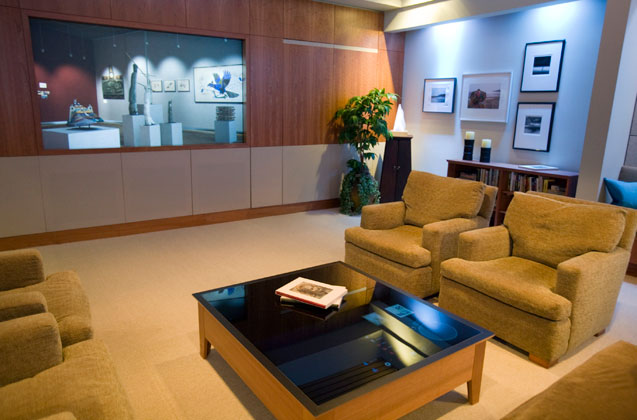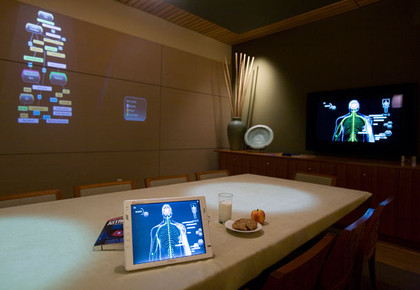The home of 2020: everything's a screen
Experts on the future of super-intelligent devices in the home

The home of the future will be a living, breathing entity that reacts to our needs, provides entertainment in any room of the house and can even take care of you when you're sick.
In many ways, the vision of robotic butlers and multiple high-def screens portrays a false concept - in the future digital home, anything can be a screen and the home itself will be a robot.
Brian David Johnson, a futurist at Intel, describes the future home as much more inter-connected and internet-aware than we currently imagine.
We have curiously understated how much media will be at our fingertips, for example. Johnson says by 2015 there will be 500 billion hours of entertainment online, or more than is humanly knowable, and as many as 15 billion devices in use.
"The future home will know our daily routines," says Johnson, describing how there won't be just a few extra 'screens' in the home by that computer interfaces will be literally all around us, in every room.
In-built intelligence
This concept of a digitally aware home will anticipate what we want. For example, Johnson says a computer might read the news aloud in the bathroom, knowing the mirror has fogged over and there is no way to interact with a touchscreen.
Get daily insight, inspiration and deals in your inbox
Sign up for breaking news, reviews, opinion, top tech deals, and more.
In the living room, multiple screens will provide a view of a sporting event, but the home will control audio levels automatically based on who is talking, where everyone is sitting, and even knowing whether you care about the outcome of the game or not.
"The home will know which interface makes sense in which room," says Johnson. "It will know that in one room, voice feedback makes sense, but in another room the flow of human behavior will dictate that hand gestures make more sense in one room as a point of control than another."
Eric Kintz, head of the video business unit at Logitech, agrees that the future digital home will encourage a much smoother flow of media consumption, that there won't just be independent, static screens in several rooms of the house but interfaces throughout the home.
Kintz says, when you watch a video in one room, you will be able to take that video with you to the next room and keep watching. The home will know what you are watching and when you move into the next room.
Another interesting scenario he describes, which is already somewhat in place using the Logitech Alert video surveillance system, is where the home transmits live video to friends and families.
In this future concept, every room can send a video feed over the Internet. Kintz says this will be increasingly important as more people start working out of their homes and families become more geographically dispersed. He says video will play an important role in the future home because it has different kind of emotional impact than e-mail, social networking, or other means of communication.
Sensor networks
The future digital home will also involve distributed computing. Today, networks tend to run to and from a central server. In the next 30 years, sensor networks will operate in a more distributed way: each sensor will communicate with the next. So, a sensor in the ice box might send a message to the water filtration system that the water quality is running low.
Or, the electric car in the garage will communicate directly with solar panels on the roof to manage energy draw.
We see this already with home automation systems that use the zigbee wireless signal: a camera at the front door can communicate over a mesh network to a motion tracker in the hallway. If the motion sensor fails, the front door camera can communicate to the camera in the next room instead.
Yet, distributed computing in the home will go much further than that. Jonathan Cluts is the director of the Microsoft Home project, which is an entire future home concept the company re-builds every two years and is located on the Redmond campus.

Cluts says distributed computing will be pervasive in the future home: knowing when you are low on milk based on sensors in the refrigerator, showing a list of possible meals you can cook and their recipes based on the food you have in the home.
Cluts says the sensor networks will even extend out into the backyard, knowing that you are cooking on the grill and offering to play a news feed as you cook. In fact, Cluts says outdoor entertainment will become more common with weatherproof HD televisions and outdoor surround audio.
Touchscreens on any surface
One of the most interesting recent visions of the future home involved a video for Corning Incorporated. Touchscreens are used all around the home - on countertops, on appliances, and even in the car.
These concepts use a durable glass material with circuits embedded below the touchscreen, similar to the iPad. Corning admits that many of the touchscreens shown in the video are quite a few years away from reality, and depend greatly on the cost of manufacturing and developing new form factors.
Yet, the digital home concept is moving ahead - Intel's Johnson says the number of screens in the home will increase dramatically in just the next five years. Entertainment will be all around us, along with news feeds, data about the home itself, and of course even more access to our work.
-------------------------------------------------------------------------------------------------------
Liked this? Then check out iPad 3: 10 things we want to see
Sign up for TechRadar's free Weird Week in Tech newsletter
Get the oddest tech stories of the week, plus the most popular news and reviews delivered straight to your inbox. Sign up at http://www.techradar.com/register
John Brandon has covered gadgets and cars for the past 12 years having published over 12,000 articles and tested nearly 8,000 products. He's nothing if not prolific. Before starting his writing career, he led an Information Design practice at a large consumer electronics retailer in the US. His hobbies include deep sea exploration, complaining about the weather, and engineering a vast multiverse conspiracy.
